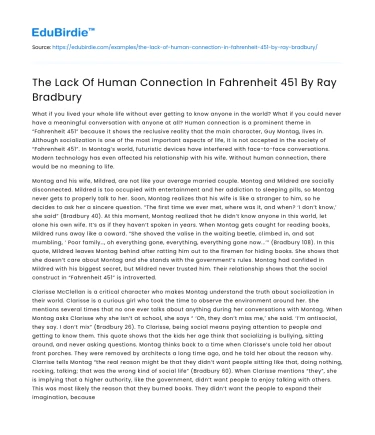What if you lived your whole life without ever getting to know anyone in the world? What if you could never have a meaningful conversation with anyone at all? Human connection is a prominent theme in “Fahrenheit 451” because it shows the reclusive reality that the main character, Guy Montag, lives in. Although socialization is one of the most important aspects of life, it is not accepted in the society of “Fahrenheit 451”. In Montag’s world, futuristic devices have interfered with face-to-face conversations. Modern technology has even affected his relationship with his wife. Without human connection, there would be no meaning to life.
Montag and his wife, Mildred, are not like your average married couple. Montag and Mildred are socially disconnected. Mildred is too occupied with entertainment and her addiction to sleeping pills, so Montag never gets to properly talk to her. Soon, Montag realizes that his wife is like a stranger to him, so he decides to ask her a sincere question. “The first time we ever met, where was it, and when? ‘I don’t know,’ she said” (Bradbury 40). At this moment, Montag realized that he didn’t know anyone in this world, let alone his own wife. It’s as if they haven’t spoken in years. When Montag gets caught for reading books, Mildred runs away like a coward. “She shoved the valise in the waiting beetle, climbed in, and sat mumbling, ‘ Poor family…, oh everything gone, everything, everything gone now...’” (Bradbury 108). In this quote, Mildred leaves Montag behind after ratting him out to the firemen for hiding books. She shows that she doesn’t care about Montag and she stands with the government’s rules. Montag had confided in Mildred with his biggest secret, but Mildred never trusted him. Their relationship shows that the social construct in “Fahrenheit 451” is introverted.
Save your time!
We can take care of your essay
- Proper editing and formatting
- Free revision, title page, and bibliography
- Flexible prices and money-back guarantee
Clarisse McClellan is a critical character who makes Montag understand the truth about socialization in their world. Clarisse is a curious girl who took the time to observe the environment around her. She mentions several times that no one ever talks about anything during her conversations with Montag. When Montag asks Clarisse why she isn’t at school, she says “ ‘Oh, they don’t miss me,’ she said. ‘I’m antisocial, they say. I don’t mix” (Bradbury 26). To Clarisse, being social means paying attention to people and getting to know them. This quote shows that the kids her age think that socializing is bullying, sitting around, and never asking questions. Montag thinks back to a time when Clarisse’s uncle told her about front porches. They were removed by architects a long time ago, and he told her about the reason why. Clarrise tells Montag “the real reason might be that they didn’t want people sitting like that, doing nothing, rocking, talking; that was the wrong kind of social life” (Bradbury 60). When Clarisse mentions “they”, she is implying that a higher authority, like the government, didn’t want people to enjoy talking with others. This was most likely the reason that they burned books. They didn’t want the people to expand their imagination, because then it would give them something to talk about.
Technology has made a big impact on human connection in real life and in “Fahrenheit 451”. The technology in the novel is advanced and it is designed to keep people occupied, which completely terminates the human connection. Montag is often annoyed when he comes home to his wife listening to the seashell radio tamped in her ear every day. He wishes that he could talk to her, so he thinks “Why didn’t he buy himself an audio-Seashell broadcasting station and talk to his wife late at night, murmur, whisper, shout, scream, yell. But what would he whisper, what would he yell?” (Bradbury 39). In this quote, Montag thinks that even if his wife wasn’t focused on technology, he wouldn’t know what to say to her. The seashell radio was her escape from reality. Another source of technology is the parlor walls. Faber explains the purpose of the walls to Montag when they talk about the importance of books. He says “The televisor is ‘real’. It is immediate, it has dimension. It tells you what to think and blasts it in. It must be right” (Bradbury 80). In this quote, Faber interprets the parlor walls as devices that feed you information so fast that you have no time to think about its accuracy. The parlor walls isolate citizens because they can directly interact with them instead of other people around them. It creates a whole new world for the viewer to live in. Entertainment can prevent us from making healthy social relationships. Technology in this world is just another permanent barrier to face-to-face conversation.
Human connection is a significant issue in “Fahrenheit 451” because it presents a real and relatable message about the modernization of the world. Seclusion became the standard in Montag’s world. Making conversation and being curious was not widely accepted. Most people who wanted to learn real knowledge from books were shut out of society. They were viewed as antisocial. In some ways, our environment is very similar to the “Fahrenheit 451” world. Although human communication is a very crucial skill, it is something that the story lacks.






 Stuck on your essay?
Stuck on your essay?

